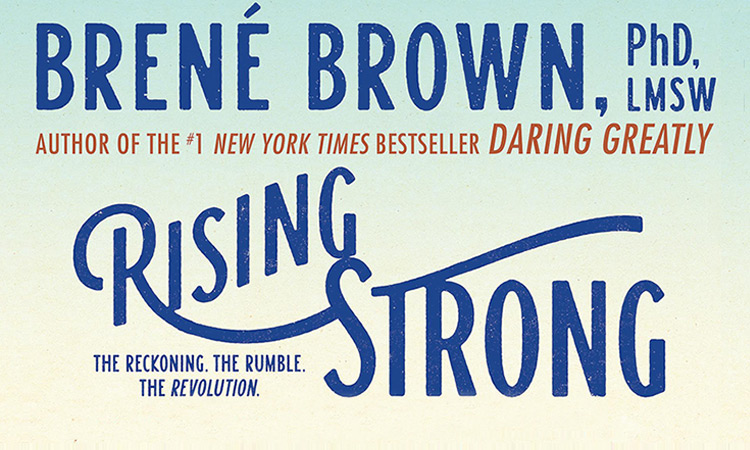 The truth is that falling hurts. The dare is to keep being brave and feel your way back up, says social scientist Brené Brown in Rising Strong: The Reckoning. The Rumble. The Revolution.
The truth is that falling hurts. The dare is to keep being brave and feel your way back up, says social scientist Brené Brown in Rising Strong: The Reckoning. The Rumble. The Revolution.
If you haven’t heard of Brown yet, it’s very likely you will soon; millions have read her best-selling books and listened to her Ted Talk on vulnerability.
Her messages about vulnerability—the willingness to show up and be seen with no guarantee of outcome as the only path to more love, belonging, creativity and joy resonate deeply with many and pack a powerful punch. Being vulnerable and learning how to let go can be an unlikely source of power.
Sure, but who the heck wants to feel vulnerable? It’s a scary, rocky place, kind of like being in a small boat tossed upon roiling waves while feeling out of control. Are we going to sail through unscathed? Or, is our boat going to capsize?
“Failing is painful. It fuels the ‘shouldas and couldas,’ which means judgment and shame are often lying in wait,” Brown says. Her message got me thinking about all the finger pointing in the world—blame-mongering corporations for one, creating stories that squarely, and falsely finger toward someone or something else. Are all these cowardly lions desperately in need of courage?
What is courage? What is rising strong? It’s the ability, Brown says, to be able to say: “Our team dropped the ball. We need to stop blaming each other and have some tough conversations about what happened so we can fix it and move forward.”
But it’s not just corporations (and politicians!) who often blame-monger and create stories. We do this in our own personal lives. “The most dangerous stories we make up are the narratives that diminish our inherent worthiness,” she says.
Lovability: Brown notes that many of her “research participants who had gone through a painful breakup or divorce, been betrayed by a partner, or experienced a distant or uncaring relationship with a parent or family member spoke about responding to their pain with a story about being unlovable—a narrative questioning if they were worthy of being loved.” She says, “This may be the most dangerous conspiracy theory of all. If there’s one thing I’ve learned over the past thirteen years, it’s this: Just because someone isn’t willing or able to love us, it doesn’t mean that we are unlovable.”
Divinity: “Research participants who shared stories of shame around religion had less in common than most people guess,” Brown says. “No specific denomination has emerged as more shaming in my work; however, there is a strong pattern worth noting. Over half of the participants who talked about experiencing shame in their faith histories also found resilience and healing through spirituality…Our faith narratives must be protected, and we must remember that no person is ordained to judge our divinity or to write the story of our spiritual worthiness.”
Creativity and Ability: “Like our lovability and divinity, we must care for and nurture the stories we tell ourselves about our creativity and ability. Just because we didn’t measure up to some standard of achievement doesn’t mean that we don’t possess gifts and talents that only we can bring to the world. Just because someone failed to see the value in what we can create or achieve doesn’t change its worth or ours.”
So, what can we do? Reclaim the truth about our lovability, divinity and creativity, Brown says. “All revolutions start with a new vision of what’s possible. Our vision is that we can rise from our experiences of hurt and struggle in a way that allow us to live more wholehearted lives. However, transforming the way we live, love, parent and work requires us to act on our vision: The rising strong process is nowhere as powerful as the rising strong practice. The revolution starts when we own and embody what lives at the heart of rising strong—the story rumble—in our everyday lives.” Let the revolution begin.

Rose Caiola
Inspired. Rewired.


